
About Andrew Cusack
 Writer, web designer, etc.; born in New York; educated in Argentina, Scotland, and South Africa; now based in London.
Writer, web designer, etc.; born in New York; educated in Argentina, Scotland, and South Africa; now based in London. read more
News
Blogs
Reviews & Periodicals
Arts & Design
World
France
Mitteleuropa
Knickerbockers
Argentina
The Levant
Africa
Cape of Good Hope
Netherlands
Scandinavia
Québec
India
Muscovy
Germany
Academica
Russia Turns a Cinematic Page in History
Big-budget film celebrating anti-Communist hero & White Russian leader Admiral Kolchak is partly funded by Russian government
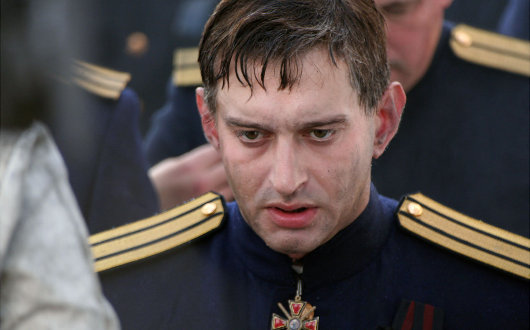
Here’s a film that has it all: naval battles, mutiny, revolution, civil war, brave men, beautiful women, sin, sacrifice, and betrayal on multiple levels. But “Admiral” («Адмиралъ»), which opened in Russia this month, is notable for another reason: this is the first major film depicting the tsarist White Russians as the good guys to receive at least part of its funding from the Russian government. The eponymous hero of the film is Alexander Kolchak, the naval commander and polar explorer who later led part of the White Army fighting the Bolsheviks during the Russian Civil War.
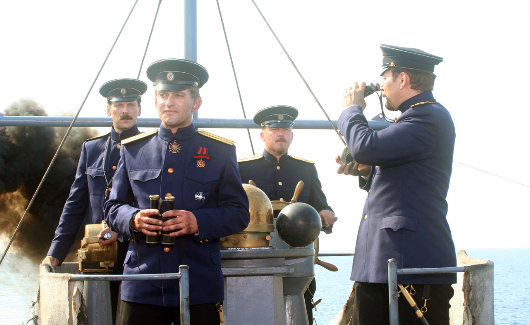
Born into a naval family in St. Petersburg in 1874, Kolchak graduated from the Imperial Naval College at age twenty and began service in the tsar’s fleet. He made three polar expeditions with the Russian Academy of Sciences, including the one in which Baron Eduard von Toll, renowned expert in Siberian paleontology, went missing and died. For his efforts in exploration, Kolchak was awarded the highest honor of the Russian Geographical Society.
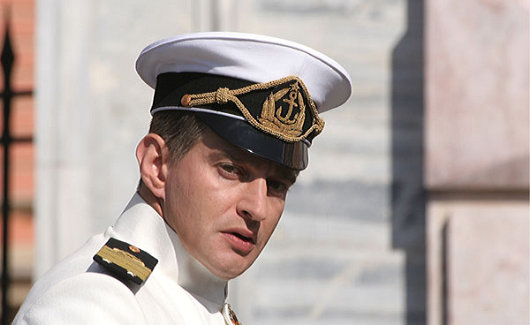
In the Russo-Japanese War, Kolchak commanded the Sokol-class destroyer Serdityi and sunk the Japanese cruiser Takasago. When the war ended, he participated in the rebuilding of the Russian Navy which had been severely reduced by the Asian war, and was on the Naval General Staff from 1906.
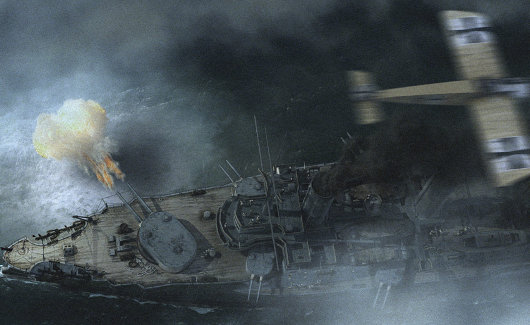
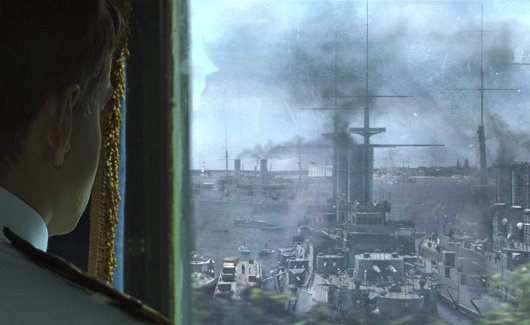
When the First World War broke out in 1914, Kolchak was a high-ranking officer in the Baltic Fleet combating the rather significant German Navy. Withing two years, however, he was the youngest officer to be promoted to Vice-Admiral, and replaced Admiral Andrei Eberhardt as Commander of the Black Sea Fleet in August 1916.
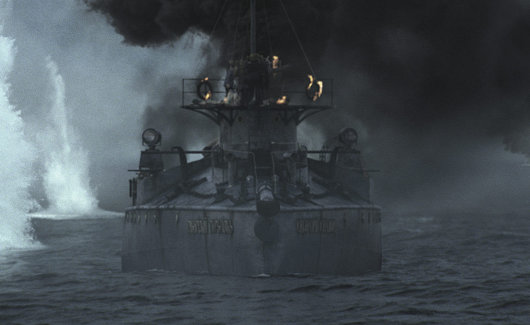
Kolchak was removed from his command after a series of mutinies and disturbances among the sailors of the Black Sea Fleet contemporary to the upheavals of the February Revolution of 1917. He was sent to visit the Allied nations as a military observer and envoy instead, and travelled to Britain, America, and Japan. When the Bolsheviks seized power in the October Revolution, Kolchak volunteered his services to the British Army, and the General Staff seriously considered sending him to Mesopotamia. Whitehall, however, felt Kolchak would be more useful fighting the Bolsheviks in Russia, and the admiral returned to Russia and joined the White forces with which he gained his greatest renown.
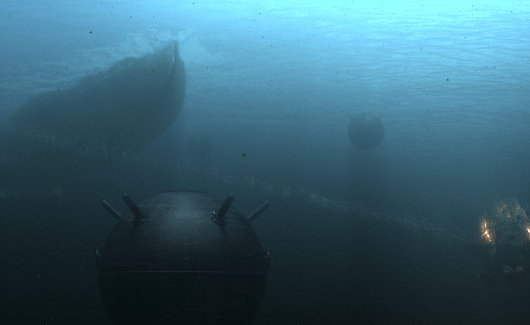
Twentieth Century Fox got behind the director Andrei Kravchuk’s film of Admiral Kolchak’s life, with most of the funding coming from the state-controlled Channel One. The film has opened in 1,247 cinemas across Russia — a record — and Variety reports that by its first weekend “Admiral” had earned $13.2 million from over 2 million ticket sales. Kolchak the movie looks well-set to recoup the budget invested, $20 million. “While the film’s budget does not sound big to a U.S. audience,” the Discovery Institute’s Russia Blog writes, “Russian filmmakers have proved once again that they can outpace Hollywood’s production with a tenth of a Hollywood film’s budget. Also, unlike Hollywood, most of Russia’s blockbusters are historic novels put on film.”
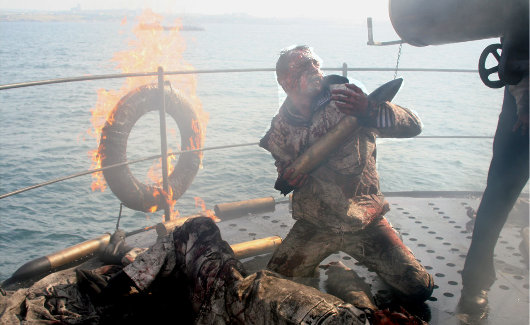
Comparing “Admiral” to the Western box-office hit “Titanic”, co-producer Anatoly Maximov told Reuters that the film “is a story of love amid extreme catastrophe but this time it’s not a ship which is sinking, it’s the entire country”.
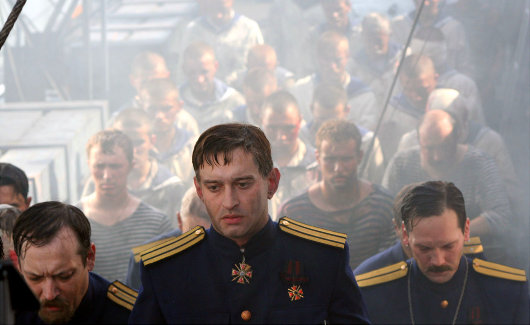
“It’s very important we talk about our history, our country, our officers,” director Andrei Kravchuk said. “If we understand that we had such a history, such people… we can fill ourselves with dignity, and the notion of motherland and patriotism, which can seem worn and tarnished, gains new, concrete, visible meaning.”
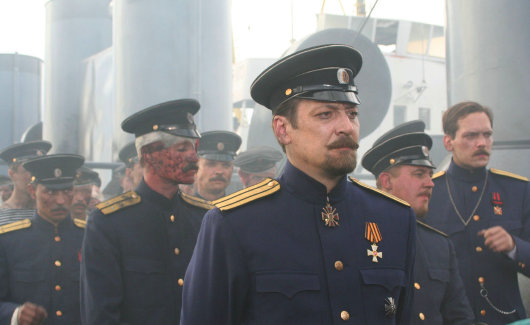
“Admiral” is but the latest in the recent revival in Russian cinema. Eighty-five Russian films were released in 2007 and another 200 are currently in production, compared to just forty-two releases a decade before. While much of the funding for this flourishing industry comes from the commercial sector, the Russian government is estimated to provide as much as a third of all funding for Russian films. The cinematography department of the Ministry of Culture invested $80 million in feature films in 2007, a figure that rose to $85 million for this current year.
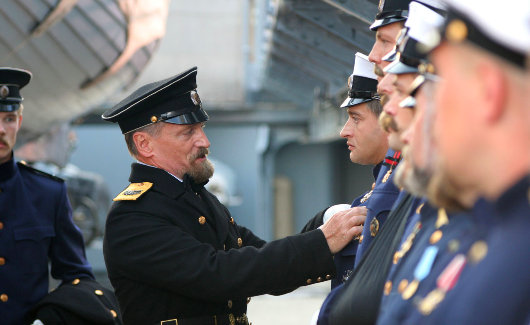
What is perhaps most remarkable about the current renaissance is that most of the films have been long high-quality historical dramas that have also proved successful at Russian box offices. Subjects and time periods have ranged from as long ago as Alexander Nevsky to as recently as the Soviet invasion of Afghanistan, but most tend to take place during the rule of the tsars.
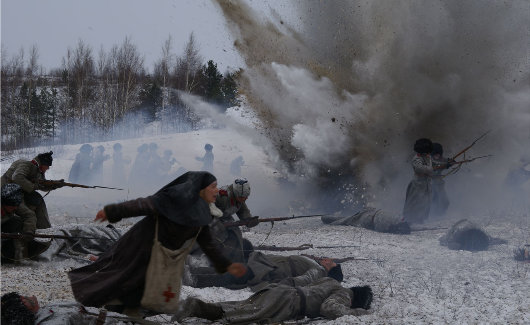
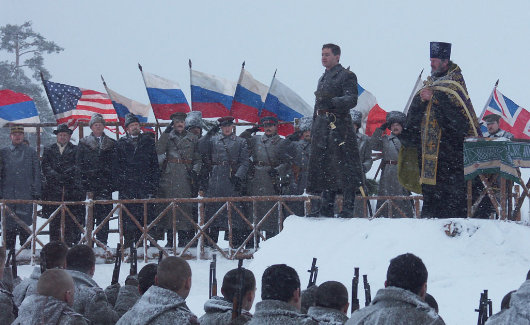
“Admiral” also shows the help the White Army received from Great Britain, the United States, and France. These three countries all sent troops to fight alongside the Whites, who also counted Poles and Czechs among their ranks. It was the “Czechoslovaks” who betrayed Admiral Kolchak in the end, stealing a great portion of the tsarist gold reserve and high-tailing it back to Prague where the legionnaires set up a bank with their ill-gotten gains.
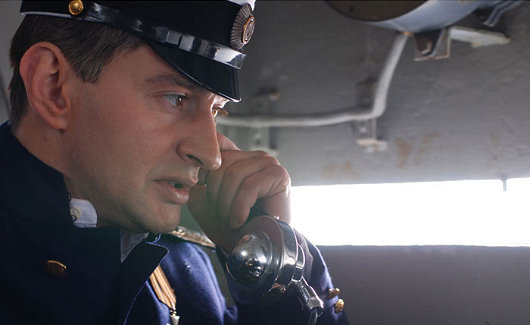
The creation of “Admiral” is a most welcome development, and one that we hope will be imitated in Russia (as it obviously will be) but elsewhere in Europe and the European diaspora. It’s heartening that both Russia is slowly but surely coming to terms with the great evil of her revolution. Equally, however, it is a great disappointment that the United States not only fails to grasp the evil of its revolution, but still foolishly persists in propagating it around the globe, often at the point of a gun.
Trailers & more pictures after the break.
Official Trailer (with English subtitles)
Teaser Trailer
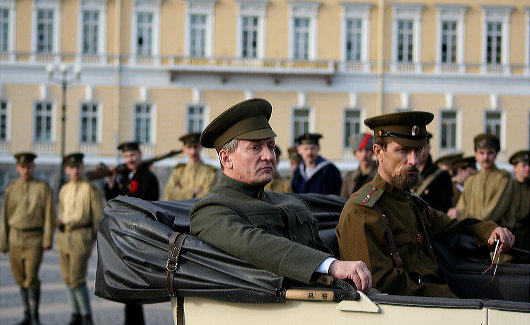
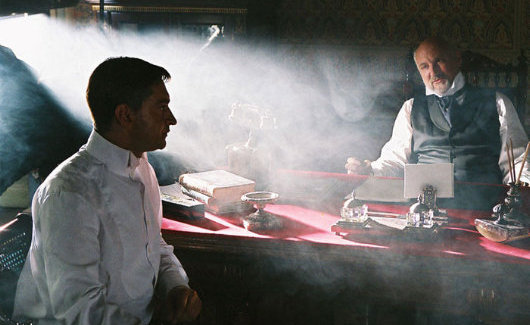

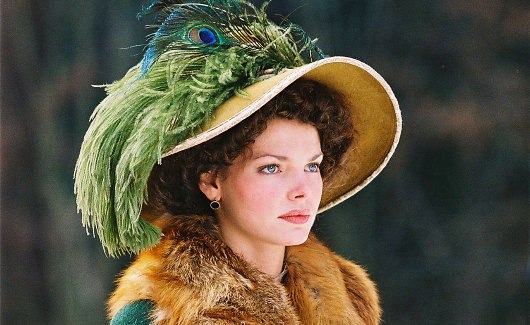
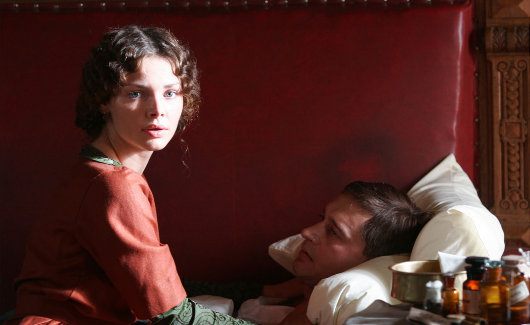
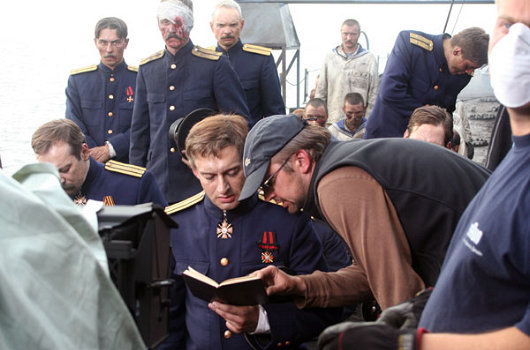
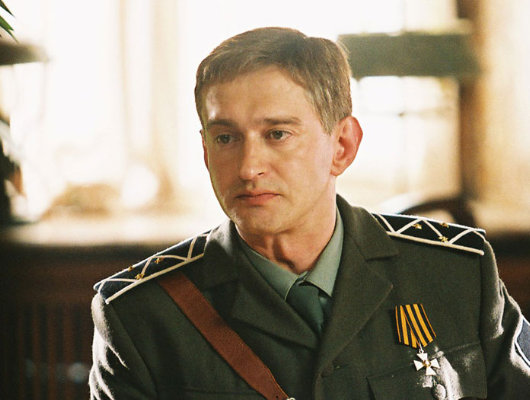
Search
Instagram: @andcusack
Click here for my Instagram photos.Most Recent Posts
- Amsterdam November 26, 2024
- Silver Jubilee November 21, 2024
- Articles of Note: 11 November 2024 November 11, 2024
- Why do you read? November 5, 2024
- India November 4, 2024
Most Recent Comments
Book Wishlist
Monthly Archives
Categories



Hmn … yes and no.
“The Island” looks harrowing, and an instant masterpiece. The rest appear a bit unsure of where they are looking for an audience.
What most struck me, and about them all, is just how authentic the actors looked, particularly in comparison with (let us get right down to the nitty-gritty) the absurdly inappropriate kid who has recently attempted to portray Stauffenberg. The effete West is hopelessly mired in a love affair with itself and sees in historical films nothing but an opportunity for dressing up and, of course, scoring ideological points.
Russia knows that it was robbed of its history for 70 years; the lessons it will learn might just save it from simply jumping on board our sinking ship.
I’ll agree that the Russian movies look fantastic, and with Clark’s observation about the absurdity of Tom Cruise, who resembles Stauffenberg only in the number of chromosomes he has, portraying the count and the motivation of American cinema generally.
But if I may quibble with one small point, I will. I think it’s hardly fair to correlate the Bolshevik and American revolutions. Even if we accept that the English monarchy is a legitimate government following both Elizabeth I and the Act of Succession, it doesn’t render all revolution inherently evil. St. Thomas tells us that much. And while experience may have showed us that republics have their shortcomings, a revolution to establish a rather disestablishmentarian and generically protestant republic isn’t really the same thing at all as a bloodbath of an uprising in the name of atheistic bolshevism. I will refrain from attempting to defend current American foreign policy, in part because it doesn’t appear to relate to the underlying question of the revolution itself.
Fascinating! I can’t wait to see it. Thanks so much for finding the stuff you find.
Now for the less agreeable part: your love of the old autocracies of Christendom, in every single context, is foolish at best. Quote for the day:
“the temptation to use power to secure the faith has arisen again and again in various forms throughout the centuries, and again and again faith has risked being suffocated in the embrace of power. The struggle for the freedom of the Church, the struggle to avoid identifying Jesus’ Kingdom with any political structure, is one that has to be fought century after century. For the fusion of faith and political power always comes at a price: faith becomes the servant of power and must bend to its criteria.”
That’s Benedict XVI, in Jesus of Nazareth. As George Weigel has written, “Those words are a sharp challenge to those Catholics who still seek a confessional state, either along the lines of the old regimes in Europe or according to a more contemporary, liberation theology model.” You’d do well to listen to the Bishop of Rome on this one, Mr. Cusack.
“I think it’s hardly fair to correlate the Bolshevik and American revolutions.”
No one was saying they were the same thing; just that they were both wrong.
I seriously doubt Mr. Cusack confuses the empire of the Romanovs with the Kingdom of Heaven, nor (if I understand his views aright) would he have any more nostalgia than the Holy Father for temporal authority’s power over the Church.
Quibus dictis–
1. His Holiness’s exhortation “to avoid identifying Jesus’ Kingdom with any political structure” is something many democrats seem to excuse themselves from. At the very least the catholic faith, born and first flourishing under despots, doesn’t require liberal democracy to thrive.
2. When we consider the significance of the episodes in the film Mr. Cusack reviews, we need not be monarchists to sympathize with the last redoubts against those who proceeded to attempt to depriest their country once they had unmonarched it, who crushed the arts and demolished churches, who banished freedom to Siberian frigor, &c. &c.
…your love of the old autocracies of Christendom, in every single context, is foolish at best
Not only is it foolish, but it is also non-existent.
Sympathizer,
1. Your tu quoque at democrats does not excuse monarchism. I agree that the catholic faith does not require liberal democracy to survive. I would add, however, that the coziness between the church and the despots in France for example, had, and still has, much to do with the virulence of laicite and the unhappy weakness of the faith in France to this day.
2. I deplore the USSR as much as you and Mr. Cusack, and my sympathies have always been with all those who opposed the Bolsheviks. I think the really good guys in 1917 were the Kadets, but alas there was very little in the way of cultural soil in Russia in which liberalism could grow up.
Andrew,
But you’re a monarchist, right?
But you’re a monarchist, right?
In terms of a general sensibility, yes, but I am not a blanket ideological monarchist.
I’ll take that to mean that you’re in favor of good monarchies, so I’ll stop asking you to answer for the flaws of actual monarchies. I’m confident that you’ll return the favor when I explain that I’m in favor of good liberal republics. ;)
[T]he coziness between the church and the despots in France for example, had, and still has, much to do with the virulence of laicite and the unhappy weakness of the faith in France to this day.
Which despots in particular, if I might ask?
Were you aware that a survey showed nearly 20% of the entire French population desired the return of monarchy?
And that traditional Catholics (usually also monarchists) are strong, flourishing, and increasing in France? Scoutisme is also thriving among French youth.
When people make comments about the state of the faith in France, or about the “corruption” of l’Ancien Régime, I often wonder where they get their information…
From history textbooks authored by good liberal republicans, no doubt…
Louis XIV through XVI. The wretched Edict of Fontainebleau in 1685 set France on the course to 1789.
I certainly hope traditionalist Catholics in France are flourishing, and I know there is some evidence of that, but I’d suggest you’re looking at this evidence through rosary-colored glasses.
Mostly through contemporaneous sources, not textbooks, actually.
I make no excuses for Louix XIV, but to claim Louis XV and XVI were “despots” is really insupportable. Louis XV brought the monarchy to shame through his incompetence and foolish personal choices, but he was hardly a tyrant. Louis XVI lived as an honest and good Catholic and died a martyr, and was no more than a scapegoat for the disgruntled mob (the same goes for Marie-Antoinette). Jacobin accounts will, of course, give a markedly different view of the latter royals’ lives in order to justify their rebellion against the king and slaughter of Catholic clergy and religious.
Far too many Catholics today think themselves quite orthodox and yet despise the civilization which embodied Catholic orthodoxy for over a millenium. To all you accuse the liberals of thinking that the Church was founded in 1963, I assert that you are guilting of thinking her to have been founded in 1953.
Will this be shown anywhere in the USA?
Oh yeah, well I assert you are guilty of thinking her to have been founded in 1943!
Andrew:
I always thought that the Czechs and Slovaks stole the tsarist gold from the Bolsheviks and then used it as a bargaining chip to get back home. Do you think that if the Whites had had the gold they’d’ve won the civil war?
xavier
Will this be released in the US ?
Thanks for posting about this movie. With any luck, I now know what I’ll be getting my dad for his birthday next summer!
I was particularly interested in what was said about recovering the meaning of “motherland” and “patriotism”.
This is one of the reasons her Russian fans say they like Lois McMaster Bujold’s Miles Vorkosigan novels. Even though they are science fiction, they presuppose a deeply patriotic hero who works hard to mend his planet’s flaws without dumping its traditions — and you can see where that would call to them.
I worry so much about Russia. So potentially great, and always so lost. But then, we’re starting to have that problem in the US….
If this gets any sort of Western release (and with Fox involved, we can hope!), I will simply have to see it. Is there any way we can encourage such a release?
Nice site you have a very nice blog you have discovered a new am your follower: D
The film makers could have done so much more with the material at hand. In addition, the love story the film features for a substantial portion of its running time basically consists of Kolchak leaving his wife and child for the wife of one of his officers for really no reason at all other than she is slightly more beautiful that his current wife. The film tries to portray it as romantic but it really does not work. They should have just dropped the love angle and done a film on the civil war.